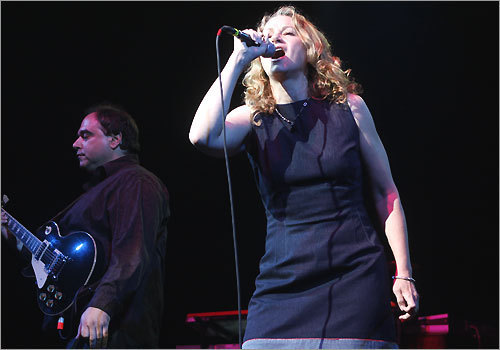Striking a chord
Here's an easy way to see if a song uses the Sensitive Female Chord Progression: Just sing Joan Osborne's lyric's: 'What if God was one of us? Just a slob like one of us?' over the suspect four chords.

Joan Osborne (Rahav Segev for The New York Times)
Even though Beyoncé's "If I Were a Boy" hit radio too late to be the song of the summer, there's still a case to be made that it's the perfect song to cap off the year. It's not because of the empathetic lyrics, or B's heartrending, disappointed vocals. No, it has everything to do with the four chords that underpin the song's verse, circling from yearning to triumph and back again, four chords that were inescapable in 2008.
Let's call this the Sensitive Female Chord Progression, so named because . . . well, because when I first noticed it in 1998 (when I became keenly aware that Sarah McLachlan's "Building a Mystery" sounded an awful lot like Joan Osborne's "One of Us"), it seemed to be the exclusive province of Lilith Fair types baring their souls for all to see. Think Jewel's "Hands." Melissa Etheridge's "Angels Would Fall." Nina Gordon's "Tonight and the Rest of My Life."
So what is the Sensitive Female Chord Progression, exactly? It's simple enough for the music theory-inclined: vi-IV-I-V. No good? Well, for a song in the key of A minor, it would be Am-F-C-G. Still confused? Here's an easy way to see if a song uses the chord progression: Just sing Osborne's lyrics, "What if God was one of us? Just a slob like one of us?" over the suspect four chords. If it fits, you've just spotted one in the wild. Once you're attuned to it, you'll hear it everywhere.
And the Sensitive Female Chord Progression was indeed everywhere in 2008, which started off with OneRepublic's "Apologize" enjoying its chart afterglow. Since then, it's popped up in songs by Aimee Mann ("Borrowing Time"), Secondhand Serenade ("Fall for You"), Katy Perry ("Fingerprints"), Moby ("Every Day It's 1989"), Sugarland ("Take Me As I Am"), Carolina Liar ("I'm Not Over"), T.I. ("Whatever You Like"), Natasha Bedingfield ("Angel"), and, in a last-minute shocker, Guns N' Roses (the chorus of "Shackler's Revenge").
It turns out I'm not the only one intrigued by this phenomenon. Hooters guitarist Eric Bazilian, the songwriter behind "One Of Us," has a particular interest in it. "I think it's a comforting chord progression," he says. "It was iconic with Heart. It became more iconic with Joan [Osborne]. It became even more iconic with Sarah McLachlan. There's not a lot of testosterone in it, even though ['One of Us'] was written by a man. But it was written by a man to impress a girl. Think about that."
The guys play with this chord progression too, of course. Boston's "Peace of Mind" and Iggy Pop's "The Passenger" gave it a whirl in the mid-1970s. The Smashing Pumpkins made it orchestral and ominous with "Disarm," Bon Jovi turned it into a pop-metal fist-pumper on "It's My Life," and the Offspring has used it no less than three times.
Composer and conductor Rob Kapilow, who hosts National Public Radio's "What Makes It Great?," says the magic of the Sensitive Female Chord Progression lies in the way it can be played over and over and return smoothly to the first chord each time. "What this allows is for it to be very fluid. You're really not centered anywhere. What it does is not have that kind of resolution, that kind of firm, declarative 'We're here.' That's part of the appeal for rock. You want to just keep cycling."
Jack Perricone, chair of Berklee College's songwriting department, thinks the mixture of chords gives the progression emotional heft. "It starts on a sense of maybe disquiet," he says. "In a sense, it's three-quarters major and one-quarter, but a very important quarter, being minor.
"And I think that has to do with credibility, what people experience in life. . . . I mean, that's not a bad mixture, one-quarter sadness or darkness and three-quarters light."
Songwriters reuse certain chord progressions all the time, from the 12-bar blues to the doo-woppish I-vi-IV-V (forever familiar to novice piano players as "Heart and Soul") that helped dominate the 1950s with songs like "Earth Angel" and "Donna." So just because the Sensitive Female Chord Progression had a banner year doesn't mean songwriters are running out of ideas - only that when Beyoncé wanted to tug at the heartstrings, she knew exactly which tool to use.
